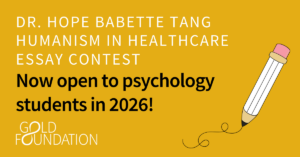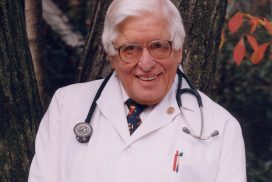The three winning educational projects for residency programs include a pilot curriculum for collaborative care of opioid-treated patients with mental health conditions, dialogue-based approaches to care, and a formal process for residents to absorb patient feedback.
The Arnold P. Gold Foundation and the Gold Foundation for Humanistic Healthcare, Canada are delighted to announce their 2017 Picker Gold Graduate Medical Education Challenge Grants, three exceptional projects designed to elevate patient-centered care in residency programs and support system-level shifts toward humanistic practices.
The awardees are:
- Juliette Perzhinsky, MD, MSc, of Central Michigan University, who will be piloting a curriculum to facilitate communication between patient and provider around mental health and chronic pain management in conjunction with an assessment of patient outcomes in her two-part study, “An Interprofessional Educational Curriculum for Optimizing Mental Health in Chronic Pain Treatment”
- Jennifer Barnett Breznay, MD, MPH, of Maimonides Medical Center and Albert Einstein College of Medicine, who will be creating a formal process for residents to receive patients’ feedback in her “CARE Feedback Study” project.
- Ayelet Kuper, PhD, DPhil, and Lisa Richardson, MD, MA, FRCPC, of the University of Toronto, who will be developing a toolkit of reflective, dialogue-based approaches to care and training more than 1,000 physicians in their project, “A Dialogical Approach to Person-Centered Care.”
The Picker Gold Graduate Medical Education Challenge Grant Program supports the research and development of successful patient-centered care initiatives and best practices in the education of our country’s future physicians. Each Picker Gold award of up to $25,000 is matched by equal funding from the researchers’ medical institution.
“The three projects this year are phenomenal, tackling serious topics of our time, including the ravages of the opioid epidemic and the need for strong, inclusive communication skills for our future physicians,” said Dr. Richard I. Levin, President and CEO of the Gold Foundation. “We know that residency is a critical time in a physician’s training. These grants specifically support projects by graduate medical education faculty to encourage institutional change, bending the system toward humanism, and adding new, cutting-edge training in compassion to residency programs.”
“A Dialogical Approach to Person-Centered Care”
The Picker Gold Grant awarded to Dr. Kuper and Dr. Richardson of the University of Toronto marks the first grant funded through the Gold Foundation for Humanistic Healthcare, Canada, which is the Canadian affiliate of U.S.-based Arnold P. Gold Foundation.
Dr. Kuper and Dr. Richardson are co-leads for Person-Centred Care Education, Department of Medicine, Faculty of Medicine, University of Toronto. Their co-investigators on this project are Dr. Arno Kumagi, Dr. Cynthia Whitehead, and Dr. Sarah Wright. The team’s focus is a new educational initiative in dialogical learning — an approach that involves reflection and dialogue, rather than cognitive-leaning, authority-based discussion.
“Rather than approaching the physician as the authority figure with the ‘correct’ solution to the patient’s problem, dialogical teaching instills in the physician the values and skills necessary to engage with the patient’s values, interests, and worldviews to mutually create a plan of care according to the patient’s specific desires and values,” the team explained in their proposal, adding, “When successful, dialogical approaches enhance sensitivity and capacity to work with patients and families of diverse cultural and social backgrounds.”
The initiative will include developing a “toolkit” of reflective exercises and prompts that faculty can use to initiate shared reflections about the patient’s experience of illness, issues of diversity/equity and social responsibility, ethics and professionalism, and the human dimensions of healthcare. These approaches are designed to be used “at the bedside,” or in clinical settings, with patients, as well as in discussions of cases by residents and mentors.
The program will begin with a pilot, and then will be rolled out to all 800 faculty members and 700+ residents in all Department of Medicine programs. These physicians work at 16 hospitals in the Greater Toronto Area, a metro region of almost 6 million people that is one of the most multicultural in the world.
“An Interprofessional Educational Curriculum for Optimizing Mental Health in Chronic Pain Treatment”
The Picker Gold Grant awarded to Dr. Juliette Perzhinsky is designed to benefit vulnerable patients who live with a mental health condition while simultaneously taking opioids to treat chronic physical pain. Compared to patients using opioid treatment who do not have a mental illness, these patients suffer from greater morbidity and premature death rates.
The central theme of this two-phase study is to build trust and foster patient-centered interprofessional collaboration with other healthcare providers when treating vulnerable patients.
This study will pilot an interprofessional educational (IPE) curriculum, incorporating and building upon preexisting interprofessional tools to teach how to effectively collaborate with vulnerable patients’ entire primary care team, including mental health professionals. The curriculum aims to enable medical residents to build long-lasting therapeutic relationships with these high-risk patients. Up to 92 trainees may participate in Phase 1, including family medicine residents, internal medicine residents, psychiatry residents, nursing, and physician assistant students. The three-hour monthly educational lessons will be held over six months.
The study will ultimately seek to answer whether the IPE curriculum increases physician confidence in treating patients with mental health conditions who use opioids for pain management. In Phase 2, the study will then investigate whether a collaborative team with physicians trained in the IPE curriculum is more effective in treating patients with mental health conditions who use opioids for pain management.
Other investigators on the project include Dr. John E. Lopes Jr., Dr. Furhut Janssen, Dr. Bernard Noveloso, Dr. Sunil Parashar, librarian and project coordinator Tamara Sawyer, statistical consultant Dr. Chin-I Cheng, and nurse liaison Joy Evans. Additional collaborators include Dr. Darleen Hoffert, Dr. Brenda Lovegrove Lepisto and Dr. Kathleen Schachman.
Dr. Perzhinsky was a 2016 Gold Humanism Scholar at the Harvard Macy Institute, where she honed her plan for the IPE curriculum. She is also a member of a 2017-2019 Gold Foundation Research Institute Mapping the Landscape team.
“CARE Feedback Study”
Dr. Jennifer Breznay was awarded a Picker Gold Grant to develop a formal method of allowing patients to evaluate residents using the Consultation and Relational Empathy (CARE) tool and incorporating that feedback to encourage residents to further develop as patient-centered physicians.
The CARE tool, a previously validated questionnaire, measures the degree to which a patient values their patient-physician relationship and to what extent they feel connected to their primary care provider. Residents will receive direct and continuous feedback from patients. Over a year, an estimated 2,000 CARE tools will be collected, translating to each resident receiving on average 20 CARE evaluations.
An educational coach will guide residents on how to interpret these CARE evaluations and set goals for improvement. The coach will reinforce the patients’ voices, enhancing respect for their values and preferences, and underscoring the Picker principle of patient-centered care.
Ultimately, the study will evaluate whether direct patient feedback leads to improved patient-physician relationships and greater physician communication skills, and whether educational coaching can lead to an even greater improvement in these areas.


